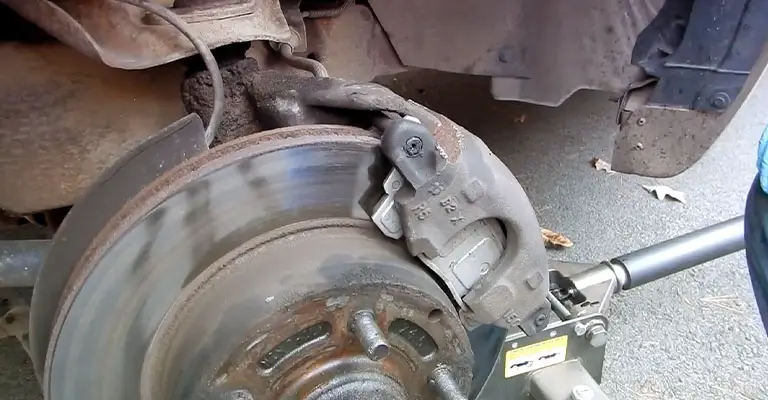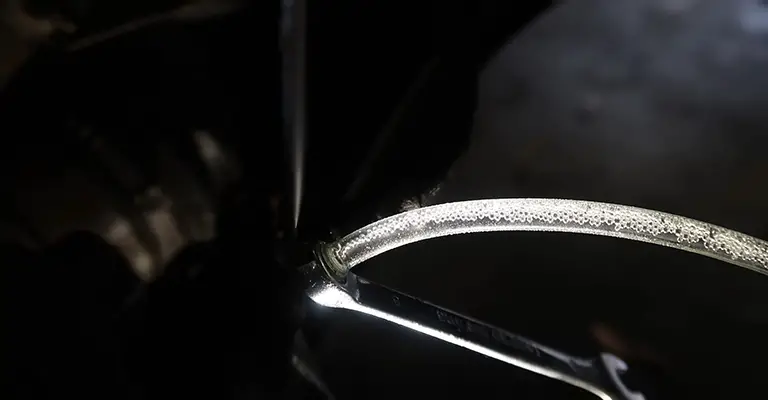It is possible for brake pads to come loose. Though there are several reasons for it, all of them end up causing problems to the brake line or brake fluid. So the brake line and brake fluid is the main reason for a brake pad to come loose.
Contents
Why Do Brake Pads Become Loose/Spongy
The main reason for the brake pads to become lose the problem with brake fluid or brake line. There are several ways the brake line and fluid can be affected. Then there’s also corrosion that can have a direct effect on the pads becoming loose.

Corrosion of The Pads
Corrosion to brake pads is not something very uncommon. If you are using your car regularly then it is highly unlikely that you will be using your pads long enough to become corroded. But it is always a possibility.
Corrosion will reduce the surface of the brake pads. Thus the caliper will not be able to grab them properly causing the brakes to become loose. This usually happens if the pads are not any use for a long time.
Corrosion of The Caliper
The caliper is the one that holds the brake pads and pushes them against the rotor to activate the brake. Corrosion can also happen on the caliper. Because of the corrosion, it can lose its grip. This corrosion can also cause it to leak brake fluid. Thus making the pads looser than before.
If you find rust on your caliper then you may need to adjust the pads with the caliper. Then if it doesn’t work, you may need to change them. To prevent corrosion you can use brake caliper paint.
Corrosion of Master Cylinder
The master cylinder is the heart of a brake system. It holds the brake fluid and generates pressure. But the master cylinder is also prone to corrosion. So it is not uncommon to develop a leak due to corrosion.
There are two types of leaks that can happen. One is the internal leak which causes by a damaged piston seal and the other one is the external leak which causes the brake fluid to leak outside.
In both cases, corrosion is the main culprit. The Master cylinder needs to be inspected properly to figure out what kind of leak has happened. In both cases, the hydraulic pressure reduces and the brake feels loose.
Thinning Out The Rotor
Braking removes material from both the brake pads and the rotor. If you are using the same rotor for a long time it will get thinner than how it was before. Thus it will cause the pads to feel loose.
A thin rotor also has more chances to break. So you should always change the rotor after a specified distance. This distance can change depending on how much you use the brakes. But roughly 70k miles is a good distance for a rotor. After 70k miles you have to change it.
Size of The Pads
Sometimes the brake pad size can make it lose. If you change your brake pad and it is smaller in size than the original pads, it can lead to loose pads. So before buying new brake pads make sure it fits with your caliper in size and does not leave any gap.
Not Installing Properly
Sometimes not installing the pads properly can cause them to come loose afterward. If the calipers are not fitted properly or the caliper and pad have gaps between them then it can cause the pads to come loose and cause a rattling sound.
The pad should be the correct size with the caliper. If it is too big and you have to force them inside the caliper, then there is the possibility that they will not retract properly. But if they are too small, they can come loose.
Air Inside the Brake Line
This is the most common cause when comes to spongy/loose pads. If the air gets into the brake line it will disrupt the flow of the brake fluid. This will end up making the brake feel spongy.
The best way to deal with this is to change the brake fluid. Over time, brake fluid absorbs moisture from the air. So you have to change the fluid sooner or later. So it is overall the best time for changing the brake fluid.
Another way to deal with brake line air the to bleed it otherwise known as flushing the brake fluid. Doing this will push the air out from the brake line.

Brake Line Damage
Damaged brake lines can also cause the brake to come loose for the same reason as before. A damaged brake line will leak the brake fluid causing it to not work properly.
If the brake line is made from a corrosive metal then over time it can rust. This corroded rust will turn into small holes in the line if left alone. Here they will leak the brake fluid causing the brake to feel spongy.
FAQ
Do all brakes fit the same caliper?
Ans: No, the shapes of the brake pads and calipers change depending on the vehicle. So not all brake pads can be fitted on the same caliper.
How often should I change the brake fluid in a car?
Ans: It is better to change the brake fluid every 2 years or 30k miles. It can cause pedal problems if not changed in time.
Do loose brake pads cause problems?
Ans: Yes, they hinder the brake performance. Sometimes they can cause rattling sounds. If the problem is caused by a leak then you have to fix the leak or else the brake will stop working.
Conclusion
So in the end, it is possible for the brake pads to come loose. But it is hard to tell exactly what is causing the pads to come loose without a proper inspection. So if you are facing this problem it is better to go to a mechanic to inspect all the parts that can cause the pads to come loose.
